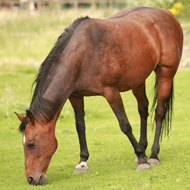Research throws light on equine grass sickness

Equine grass sickness affects mainly grazing equines.
New, free-to-access research on equine grass sickness has been published in the Equine Veterinary Journal (EVJ).
The EVJ’s equine grass sickness collection reports novel risk factors for the disease, identifies key differences between EGS and botulism, and reports a novel diagnostic technique.
It also shows the value of monitoring weight loss to help predict whether horses with chronic EGS are likely to survive.
“While the cause of equine grass sickness continues to evade us, these papers present an optimistic step in the right direction for the eventual prevention of this dreadful disease,” said Professor Celia Marr, editor of the EVJ.
The EVJ say that despite 100 years of research - supported by the Moredun Foundation’s Equine Grass Sickness Fund - the cause of EGS remains unknown. Since it affects mainly grazing equines, experts say a pasture-dervived neurotoxin may be important in the development of the disease.
Professor Bruce McGorum, head of the equine section at the Royal (Dick) School of Veterinary Studies & Roslin Institute in Edinburgh, has been leading much of the research.
“Given that our recent research suggests that EGS is unlikely to be caused by neurotoxins from Clostridium botulinum we are now moving on to determine whether EGS is caused by ingestion of mycotoxins produced by pasture fungi,” he said.
EGS causes gut paralysis as a result of damage to parts of the nervous system that control involuntary functions. Acute and sub-acute EGS is invariably fatal, while around 55 per cent of chronic cases can survive and return to a useful working life.



 The latest
The latest